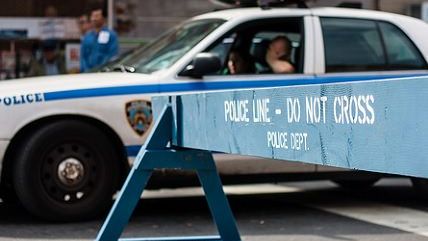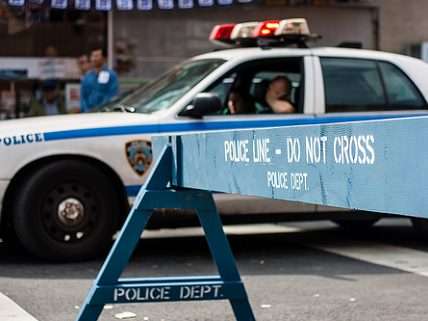Federal Judges Relaxed Rules for New York City on Responding to Lawsuits Against Police
Running out the clock?


The New York Police Department faces a lot of lawsuits; claims against the department went up 71 percent between 2001 and 2010, and in that year the city paid out $135.8 million in settlements.
The next year, in an effort to "promote the just, speedy and inexpensive resolution" of lawsuits filed against the NYPD in the Southern District of New York (covering Manhattan and the Bronx), a panel of judges adopted new rules for police lawsuits. The New York Times reports:
Under the plan, which was created by a subcommittee overseen by Judge Paul A. Crotty, a former head of the New York City Law Department, the city has been given 80 days to respond to lawsuits, rather than the 21 days allowed by standard federal rules. While the city is required to produce some evidence quickly, most of it is postponed, and all discovery can be halted if a defendant moves to dismiss the suit.
Plaintiffs are required to authorize the release of medical records and sealed arrest records related to the lawsuit. They must also provide a list of all previous arrests, sealed or unsealed, although the city is only obliged to turn over indexes of previous complaints about officers that are similar to those in the lawsuit or that could raise questions about the officer's credibility.
In addition, the rules provide for the automatic adoption of a protective order that allows any party to designate certain evidence as confidential. Lawyers are permitted under the rules to ask that a case be exempted from the plan, but judges may deny those requests.
If a case is not settled within three months of the city's initial response, both sides are required to attend a mediation session. And if there has been no resolution at the end of the plan's process, which lawyers said can take about six months, cases proceed with full discovery.
The plan does not apply to some cases, including those seeking reform or injunctive relief.
The judges are deciding whether to keep , change, or abandon the new rules and taking comments from lawyers. According to the Times, city officials are pushing for the" temporary" plan to be made permanent, citing that more cases have been settled with city lawyers spending fewer time, on average, on those cases, while the NYCLU is pushing for the court to release more data about processed lawsuits and allow time for public comment. The Times also illustrates how the rules make it easier to keep the identity of cops accused of brutality concealed. Read the whole thing here.
Editor's Note: As of February 29, 2024, commenting privileges on reason.com posts are limited to Reason Plus subscribers. Past commenters are grandfathered in for a temporary period. Subscribe here to preserve your ability to comment. Your Reason Plus subscription also gives you an ad-free version of reason.com, along with full access to the digital edition and archives of Reason magazine. We request that comments be civil and on-topic. We do not moderate or assume any responsibility for comments, which are owned by the readers who post them. Comments do not represent the views of reason.com or Reason Foundation. We reserve the right to delete any comment and ban commenters for any reason at any time. Comments may only be edited within 5 minutes of posting. Report abuses.
Please to post comments


Not to mention allowing more time to concoct a cover story and make sure that everyone has it down pat.
Bloomberg has been mayor since January, 2002. $135 million in settlements is great for business -- plaintiffs' lawyer business that is. Hey oh!
Tell Murkin! Damn joooooooooooooze!
One rule for the king's men, another for the proles. Got it.
It's still July, so
Albuquerque alt-ed periodical expresses surprise that overturning DOMA didn't cure homophobia.
He added that to ensure this unfortunate incident isn't repeated, the company will be conducting additional sensitivity and non-harassment training for all its employees.
More time being paid for sitting around!
iirc, the way it works around my part is if the acccusation is exonerated or non-sustained, then the file is sealed and it's non-disclosable. That seems fair to me.
Of course it is, to you.
On the other hand, for the rest of us, it can be used to establish the likelihood of a pattern of behavior.
For example - pick a crime cops are often (falsely) accused of. Now compare the number of accusations for that particular crime a defendant has gotten compared to the average for that police force in general.
Its not 100% but you'll have a hard time countering accusations of, say, excessive force if your numbers are too far out of whack with the rest of the force.
And as you've pointed out before - from the other side - these aren't *criminal trials* so the burden of proof is lower.
What these guidelines do is try to hamper the efforts of the plaintiff from getting the sort of evidence that is normally made available in *every* other civil trial.
My agency uses a computer program that does exactly what you say - look for patterns, etc. and gives the admin early alerts on officers who may be developing problem behavior.
You have to correlate the complaint rate, use of force rate, etc. with the # of arrests the officer makes, and the district they work. One of our precincts for example has more uses of force than the next 3 precincts combined. Are the officers more brutal there? No. There are simply more hardcore criminals there. More pursuits, more shootings, more felony stop, more uses of force.
I think it's fair to keep non-disclosed false complaints because it's unfair to smear an officer with a complaint that was found to be bogus, but the mere accusation is still there.
So, yea you look for patterns, but you correlate it with the # of arrests the ofc. has, the # of contacts (terry stops, etc.) he does, the district he works, the hours he works, etc.
And you look for outliers.
Frankly, a big thing is how you talk to people. I get VERY few complaints, and it's largely because i do the right thing, but also because I'm good at establishing rapport and frankly, getting the bad guy to like me. Treat people with respect and be firm (don't show weakness) but fair and empathatic and you will get far less complaints for DOING THE SAME THING, to include baton strikes or whatever, vs. the ofc. who uses force similarly, but doesn't know how to talk to people to get them to accept their fate, so to speak. .
To cut the ones *actually* found to be false, yes. The ones where there is merely not enough evidence to support the accusation, no. And this new set of rules does exactly that.
And here I've been lately lamenting the disappearance of "fewer" resulting from the virulence of "less."
And it's 'hopefully' the case!
Since fewer missed out on being used so many times when it should have been used, it is only fair to know let it be used a few times in places where less should be used.
Cops. The new master race.
To serve and protect, my ass.
I scrolled down to the bottom quickly, and for a split second I thought you were Dunphy. And I was really confused.
🙂
And this is relevant to this thread ... how exactly?
*Deep Breath*
JOOOOOOOOOOOOOOOOOOOOOOOOOOOOOOOOOOOZ!
I rather doubt it.
Because to a racist, racism is relevant to *any* discussion.
This is Murkin posting here.
The dumbass couldn't even figure our that Ira Stoll is a "he". And the dumbass expected to be taken seriously why....?
BTW, racism is the troll's schtick. The purpose of that narrative I don't know and I do not trust.
*out
What do you mean Gershwin was gay? He was married to his wife Ira for crimminy sakes!